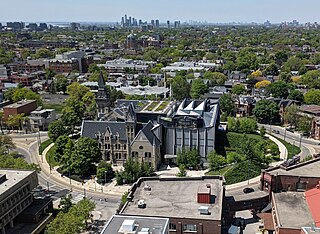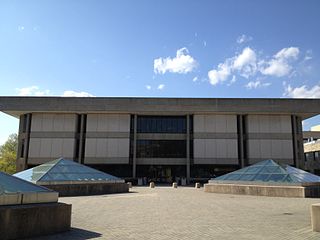The National Institutes of Technology (NITs) are centrally funded technical institutes under the ownership of the Ministry of Education, Government of India. They are governed by the National Institutes of Technology, Science Education, and Research Act, 2007, which declared them institutions of national importance and laid down their powers, duties, and framework for governance. The act lists 31 NITs. Each NIT is autonomous and linked to the others through a common council known as the Council of NITSER, which oversees their administration. All NITs are funded by the Government of India.
The Master of Architecture is a professional degree in architecture qualifying the graduate to move through the various stages of professional accreditation that result in receiving a license.

B.S. Abdur Rahman Crescent Institute of Science and Technology is a private deemed university located in Tamil Nadu, India. Founded in 1984, Crescent was one of the first self-financing engineering institutions in the Indian State of Tamil Nadu. After being affiliated to University of Madras and Anna University for 25 years, Crescent was Deemed to be University by Indian Government and was known as B.S. Abdur Rahman Crescent University. Since 2017, Crescent is known as B.S. Abdur Rahman Crescent Institute of Science and Technology.

Graduate School of Architecture, Planning and Preservation (GSAPP) is the architecture school of Columbia University, a private research university in New York City. It is also home to the Masters of Science program in Advanced Architectural Design, Historic Preservation, Real Estate Development, Urban Design, and Urban Planning.
A Bachelor of Architecture (BArch) is a bachelor's degree designed to satisfy the academic requirement of practising architecture around the world.

The A. Alfred Taubman College of Architecture and Urban Planning, also known as Taubman College, is the school of architecture and urban planning and one of the nineteen schools of the University of Michigan located in Ann Arbor, Michigan.

CEPT University, formerly the Centre for Environmental Planning and Technology, is an academic institution located near University Area in Ahmedabad, India offering undergraduate, postgraduate and doctoral programmes in areas of natural and developed environment of human society and related disciplines.

School of Planning and Architecture Delhi is a higher education federal institute located in Delhi, India specializing in education and research, and serving as the national centre of excellence, in the fields of planning and architecture. The institute primarily offers undergraduate, postgraduate, doctoral and executive education programs. It forms part of the league with other two Schools of Planning and Architecture, namely SPA Bhopal and SPA Vijayawada established by the Government of India to provide quality Architecture and physical planning education.

The Indian Institute of Technology Madras is a public technical university located in Chennai, Tamil Nadu, India. It is one of the eight public Institutes of Eminence of India. As an Indian Institute of Technology (IIT), IIT Madras is also recognised as an Institute of National Importance.

The John H. Daniels Faculty of Architecture, Landscape, and Design is an academic division at the University of Toronto which focuses on architecture, urban design and art. The Faculty was the first school in Canada to offer an architecture program, and it was one of the first in Canada to offer a landscape architecture program. As of July 2021, its dean is Juan Du.

The Eastern University is a private university located in Road 6, Block B, Ashulia Model Town, Savar, Dhaka-1345.The Eastern University was established in 2003 under the Private University Act 1992, and later on approved under Private University Act of 2010. The university was set up by Eastern University Foundation - a non-profit, non-political and philanthropic organization. Its founders include academics, chartered accountants, engineers, industrialists and retired civil servants. The Foundation has 30 members. The governance of Eastern University is carried out as per the Private Universities Act of 2010 by several bodies: Board of Trustees, Syndicate, Academic Council, Curriculum Committee, Finance Committee, Teacher Selection Committee and Disciplinary Committee.
The Schools of Planning and Architecture (SPAs) are centrally funded technical institutes located across India. They are a group of autonomous public institutes of higher education under Ministry of Education, Government of India. They were established with the objectives of providing quality Architecture and physical planning education. The SPAs primarily offer undergraduate, postgraduate, doctoral and executive education programmes.

Founded in 1854, the Department of Architecture (D-ARCH) at ETH Zurich in Switzerland is an architecture school in Zürich, providing education in the fields of architecture, landscape architecture, urban planning, and urban design. It has around 1,900 students, 350 staff members, and an annual budget of CHF 40 million.

Jamal Mohamed College is a Government-aided and self-financed institution founded in 1951 by M. Jamal Mohamed Sahib and N.M. Khajamian Rowther. The college campus is located in Tiruchirappalli, India and is affiliated to Bharathidasan University. The Day session is for male students and the Evening session is for female students.
Universidad Católica de Santiago de Guayaquil (UCSG) is a private, Catholic, higher education institution, along with Pontificia Universidad Católica del Ecuador in Ecuador.

The College of Architecture, Arts, and Design formerly the College of Architecture and Urban Studies at Virginia Tech consists of four schools, including the School of Architecture, which consistently ranks among the best in the country. Headquartered in Blacksburg, Virginia, the college also has sites in Alexandria, Virginia, and Riva San Vitale, Switzerland. Spread out among these three locations, the college consists of nearly 2,200 students, making it one of the largest schools of architecture in the nation.
The National Aptitude Test in Architecture (NATA), is conducted by National Institute of Advanced Studies in Architecture (NIASA), which is a body of Council of Architecture, New Delhi in India. The National Aptitude Test in Architecture is a national level examination for admission to undergraduate courses in architecture. The test measures the aptitude of applicants for a specific field of study in areas like drawing and observation skills, sense of proportion, aesthetic sensitivity and critical thinking, qualities that have been acquired over a long period of time and that are related to architecture.

India has the largest numbers of engineers as well as the largest number of engineering education institutes and infrastructure in the world. As of 2021, India annually produces 1.5 million engineering graduates. India's technical education infrastructure includes 2500 engineering colleges, 1400 polytechnics and 200 schools of planning and architecture.

APJ Abdul Kalam Technological University (KTU) is a state public technological university headquartered at Thiruvananthapuram, Kerala, India.

The National Institute of Technology Tiruchirappalli is a national research deemed university near the city of Tiruchirappalli in Tamil Nadu, India. It was founded as Regional Engineering College Tiruchirappalli in 1964 by the governments of India and Tamil Nadu under the affiliation of the University of Madras. The college was granted deemed university status in 2003 with the approval of the University Grants Commission (UGC), the All India Council for Technical Education (AICTE), and the Government of India and renamed the National Institute of Technology Tiruchirappalli.















